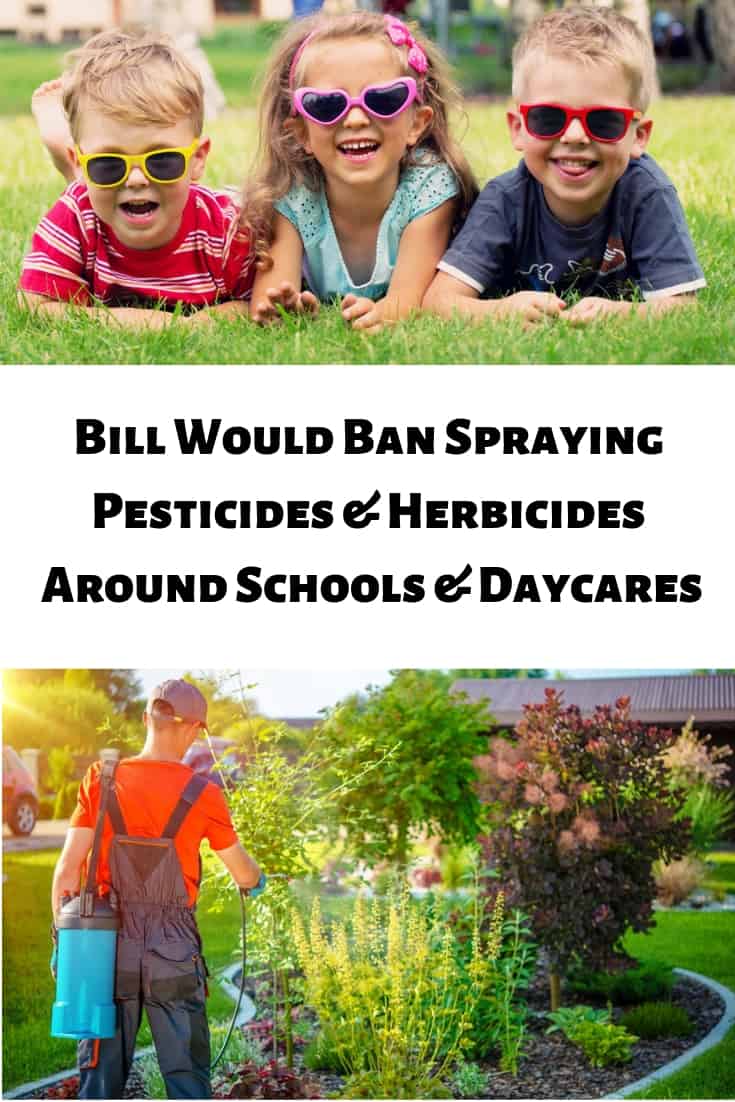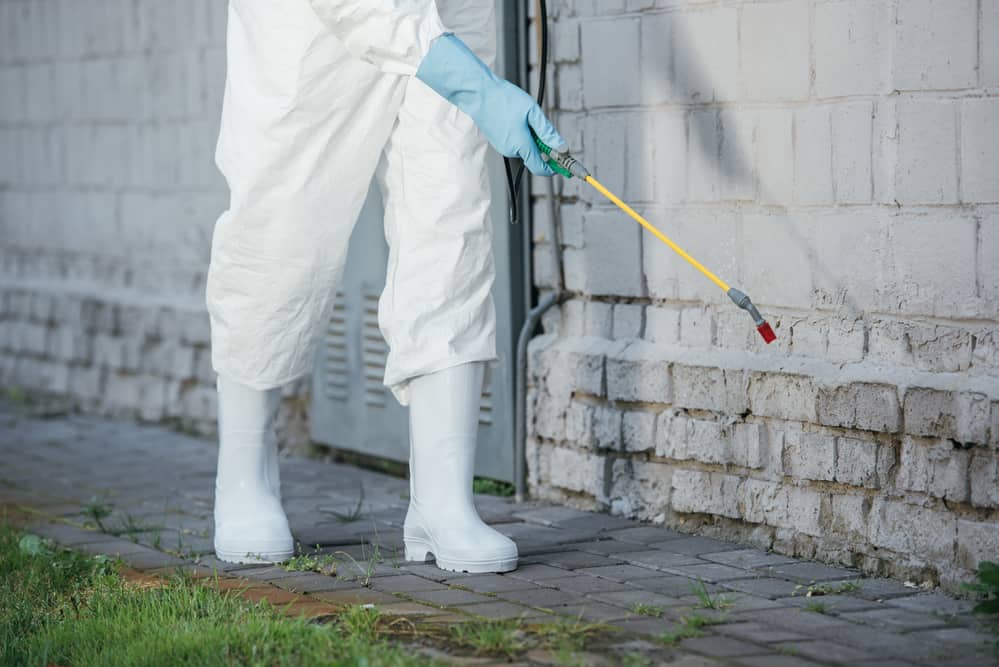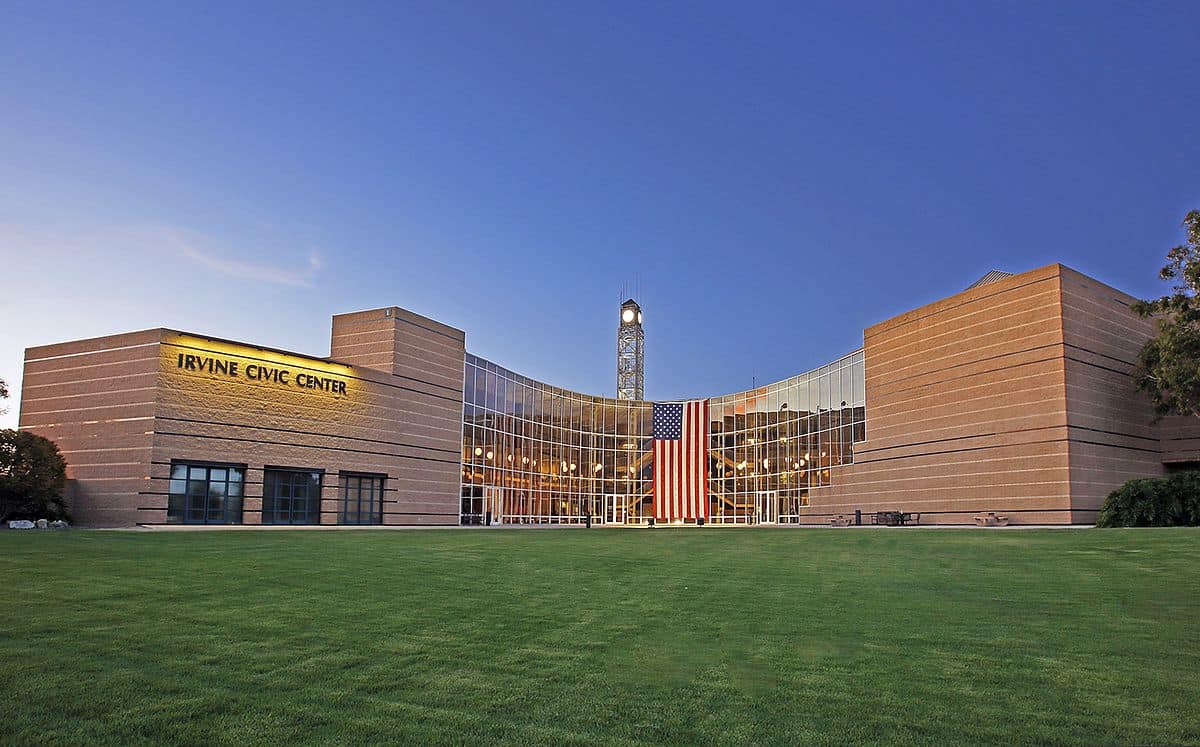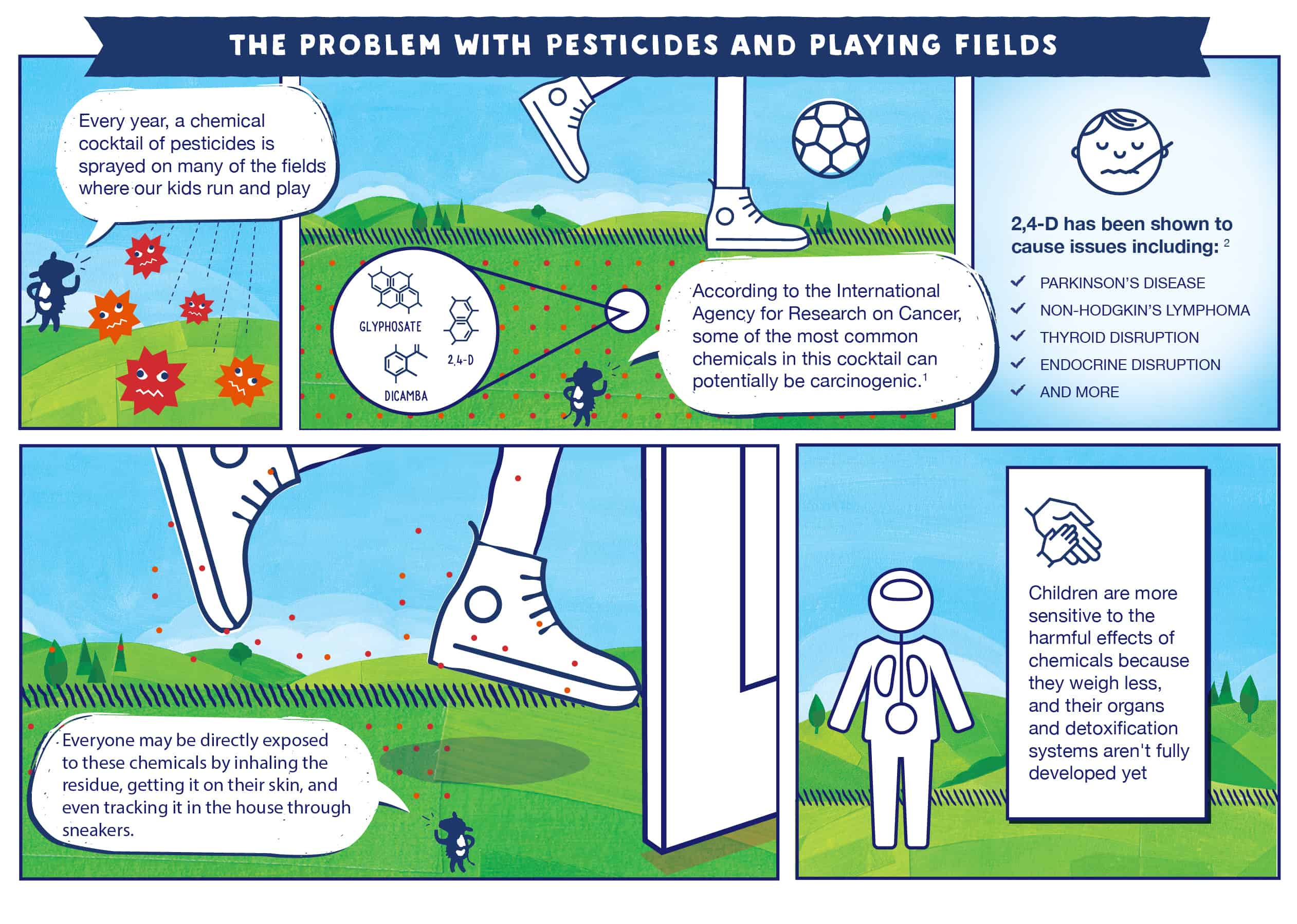Would you like to reduce the amount of pesticides your children are exposed to? Pay close attention because the California Legislature is about to consider making “organic landscape management” the go-to for public schools and daycares in California. And everyone knows that what happens in California doesn’t stay in California. (*wink wink*) You’ve trusted Mamavation to bring you topics like safest cookware, safest small kitchen appliances, and safest deodorants, now join us as we bring you a movement across the country to restrict spraying pesticides and herbicides around children.
Organic landscape management is a certified way of dealing with pests & landscaping that is better for human health, the environment, and the pocketbook. This movement is the framework needed for a switch to a chemical-free, safe environment for children in public schools. Assemblymember Muratsuchi of California recently introduced AB 468 which will mandate that schools and daycares follow the principles of organic land management when they treat for pests and weeds, similar to what the State of New York did recently.
Table of Contents
Spraying Pesticides & Herbicides in Public Settings Exposes the Most Vulnerable–Pregnant Women & Children.
Every day schools across the country spray pesticides. It happens in parks, schools, playground, daycares and community centers where children and pregnant women reside. These chemicals have been designed to kill, so it’s no wonder they are also problematic to human health. Pesticides as a category are problematic to the most vulnerable, pregnant women and children, in trace amounts similar to a drop in an Olympic sized pool. These hormone-disrupting chemicals get into the air we breathe, the water we drink, and the food we eat when spraying happens in the community. But the community pays a steeper price being burdened with an increase in medical costs, loss of wages & opportunity, and poorer quality of life. Finding ways to avoid this cycle is a wise decision.
Pesticides are linked to conditions like attention deficit hyperactivity disorder (ADHD), autism, Parkinson’s disease, infertility, birth defects, cancers, childhood cancers, among other health issues. They are commonly found in parks, schools, and public spaces and are both toxic to humans and the environment, especially pregnant women and children in trace amounts. These chemicals are commonly applied several times per year and can be very persistent, meaning they don’t go away. Here are some of those chemicals that likely are left behind some residue from spraying in public spaces:
- Glyphosate
- 2,4-D
- Dicamba
- Permethrin (Astro)
- Bifenthrin (Allectus, Talstar)
- Cyfluthrin (Tempo)
- Cypermethrin (Demon)
- Thiamethoxam (Meridian)
- Imidacloprid (Merit, Lallet)
- Dinotefuran (Zylam)
- Dlothianidin (Arena, Aloft)
- Organophosphate (OP) (e.g., acephate [Orthene]
- Chlorpyrifos [Dursban]
- Trichlorfon [Dylox]
- Carbamate insecticides carbaryl [Sevin]
- Methiocarb [Mesurol]
What is Organic Landscape Management and How Does It Benefit Your Family
The model of organic land management is similar to organic farming. Whereas conventional farmers can use up to 900 different chemicals that are mostly toxic persistent pesticides to manage pests and weeds, organic farmers use several other methods before considering organic chemical pesticides. These techniques promote ecological balance on the farm, such as using cover cropping, crop rotation, planting buffers and hedgerows, and building up soil health to keep pests and diseases away. Then if all these methods are exhausted, there are about 25 approved chemicals they can use that don’t disrupt the environment and are not persistent. These chemicals are reviewed by the National Organic Standards Board and are little risk to human health or the environment.
When it comes to organic landscape management, the idea is very similar. Organic landscape management is about caring for the soil in such a way that it deters pests and weeds naturally. These methods generate more microbes and bacteria in the soil, encourage deep root growth, and add more natural nitrates to the soil for plant growth. Conventional means deplete the soil of natural bacteria & nutrients which make them more dependent on chemicals, but once these chemicals are removed and the soil is fed with organic compost, compost tea, and other organic materials, less care is needed. The entire process takes between 1-3 years depending on how much chemicals were left behind in the soil.
Here’s an explainer from Northeastern American Farmers Association, “In an organically managed landscape, soil fertility is enhanced by feeding the soil, not the plant. Carbon and nitrogen are applied to the soil in the form of manure, compost, blended organic fertilizers, and cover crops, and the soil food web breaks these organic materials down into the nutrients that plants need. Horticultural methods that short-cut this natural process by supplying synthetic nitrogen, phosphorus, and potassium (NPK) directly to plants lead to damaged soils and weak root systems, making the plants more susceptible to insects, disease, and drought. Repeated, excessive application of synthetic fertilizers may also inhibit the development of mycorrhizae – symbiotic fungi growing on or around plant roots that help to gather nutrients beyond the range of the roots themselves. Eventually, the soil structure collapses and the soil becomes infertile. To revive dead, compacted soil, it may be necessary to apply compost to reintroduce soil life.”
Researchers Concluded Organic Land Management Costs The Same As Conventional, Or Maybe Less, And Is More Beneficial To The Soil
Does organic land management cost more than conventional means? Well, some say no and some say it’s even. But regardless of which one is true, either is great news because financial resources are typically the excuse agencies use to avoid organic land management. Because that’s not an issue here, there are less reasons to deter adoption.
New York has made strides here. The environmental health group Grassroots Environmental Education released a report comparing the costs of maintaining a typical high school football field both with a chemical-intensive program and with an organic land management program over a five year period. This report was prepared for members of the New York State legislature who later voted in favor and passed an organic land management program statewide. The report concludes that the annual cost of maintaining a field using natural products and techniques can be as much as 25% lower than the cost of conventional programs using chemical fertilizers and pesticides.
This analysis demonstrates that the cost of a natural turf management program is incrementally higher in the first two years, but then decreases significantly as soil biology improves and water requirements diminish. Total expenditures over five years show a cost savings of more than 7% using natural turf management, and once established, annual cost savings of greater than 25% can be realized.
And Harvard has gotten involved to sing praises as well. Harvard Yard Soil Restoration study compared chemical-intensive programs to organic land management programs and found significant benefits to organic land management. The organic land management program areas developed healthier and longer root systems, improved moisture retention, required less irrigation and improved available nitrogen in the soil to a healthy range because of beneficial fungi, bacteria, and beneficial predators. That’s because the waste from beneficial predators like protozoa & nematodes is nitrogen. These plots also required about 50% less water, which would be incredible water saving for drought-ridden California as well. Harvard was so impressed by the results they are increasing their organic land management program!
California City Irvine Started a Trend By Banning Pesticides on City Property in Southern California. Can The Rest of California Do This?
The City of Irvine became the very first city in California to ban the use of synthetic pesticides on city property. The Council adopted an organic management policy that limits the use of synthetic pesticides on city property, which includes 570 acres of parks, 70,000 trees, 800 acres of right-of-way, and nearly 1.5 million square feet of facilities.
The Mayor of Irvine is very excited about what they have done and she is very active in encouraging other cities, parks, and schools to copy what they did. Not only are they saving money, but they are creating a safer environment for pregnant women and children in the city.
The mayor of Irvine, California, will tell you that costs are about the same when you add everything together. She adds “Why did it take a group of citizens coming forward for us to recognize that we should be doing this? This is such common sense.”
The law change in Irvine came about because clusters of childhood brain cancers prompted local parents to band together, advocate for their children at the local city council, and end the use of spraying pesticides.
Stonyfield #PlayFree Initiative to End Pesticide Spraying in Public Parks and Open Spaces Where Children Play
Stonyfield Organic started a nationwide program to support the adoption of organic landscape management inside parks where children play, especially places like soccer and baseball fields.
We want to ensure that every kid in America is protected from harmful chemicals and toxins. It starts with food, but we believe all children should play free as well– free from worry, free from harmful chemicals, and free from toxic persistent pesticides” said Chairman & Co-Founder Gary Hirshberg.
Several cities & park districts across the nation have signed up for the Stonyfield Play Free program to receive free training, access to resources, and financial support turning to organic land management. In California, the cities of Burbank, Irvine, Costa Mesa, & Tustin, are already working on converting parks and public spaces. Other cities like Salt Lake City, Hyattsville, North Miami, Houston, South Portland, and Dover have projects in the works as well. If you are reading this and want to apply for resources from Stonyfield for your city or park, monitor this page for when they open applications again.
Northeast Organic Farmers Association (NOFA) are Certifying Processionals for “Organic Land Care”
Organic farmers are starting to organize around this issue of helping cities & parks end spraying of pesticides to protect children. The Northeast Organic Farmers Association (NOFA) in Massachusets organized a certification program for “Organic Land Care” and are expanding it across the nation. Thus far, approximately 500 professionals from 18 states are accredited by NOFA. The accreditation program is an opportunity for cities, states, homeowners associations and other concerned citizens to find education courses, referrals, networking, newsletters, publicity, media interviews, and collective, regional marketing concerning organic land care. Business-level organizations get a listing on their on-line searchable database so homeowners can contact local, organic, accredited professionals nearby.
California Legislation: Support The Children’s School Environment Act (CSEA) to Start a Nation-wide Trend
California has decided to bring legislation to the Capitol to support organic land management inside schools and daycares across the state similar to New York and Connecticut. Assemblymember Muratsuchi recently introduced AB 468 requiring California schoolsites and day care centers to utilize organic landscape management practices in outdoor places at schoolsites, including playgrounds, turf and athletic fields. The purpose of this legislation is to protect our most vulnerable population from the effects of pesticide spraying.
In California, you have the right to be notified before pesticides are sprayed at your kids’ school, but some schools are not very good at alerting parents. This has happened to me several times. And those parents that want to avoid pesticides are forced to pull their children from school. This bill will no longer force parents who are concerned over pesticides to miss school when spraying happens. And it also serves to protect ALL the children and workers at that school.
This bill needs public support so the founders started up a Change.org petition to garner support across the country. Sign this petition today to show your support!.
Click here to sign the Petition Supporting the Children’s School Environmental Act!
And if you are from California, call your local Assemblymember to show your support on AB 468 to end pesticide spraying at school!
Pin it!










 Arsenic & Heavy Metals Found in Juices–So Who is Guilty? These Brands!
Arsenic & Heavy Metals Found in Juices–So Who is Guilty? These Brands!
loved the article, Thanks for sharing!
Hey everyone, I found a unique website that offers personalized portraits for babies and children. They saved us when we missed our photoshoot due to the pandemic. Try them out!
Here’s the link: https://loveandbub.com/
Hello there, Thank you for sharing this great informative article with us. You explain it very well with relevant points. even though its necessary to clean school premises but using pesticides are harmful to kids and children.
thanks prami
I support the bill. California government should pass this bill. The pesticides definitely are harmful to kids health. While going to school they breathe in the same and these chemicals enter into the kids body via their nose. Which is very harmful.
Iddk man the way the NFL is still lass heavy minus tthe Ravens
and a few others, I can see teams going after him inn the 1st round.
Wow I just thought about iff Alll Davis was still alive,
he’s moviing up to take him lmao
Thanks for the infographic as it helped me a lot to understand the point. And Yes, we want our children to be in anice and safe environment. I was so concerned about children that during initial years I gifted only Soft Plush Toys from Urban Dhaage which are safe for toddlers.